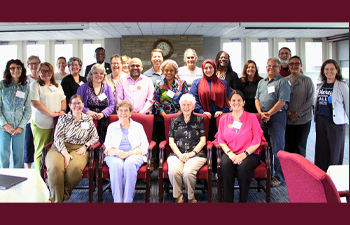
SXU Hosts Mercy Roundtable

Saint Xavier University (SXU) hosted the Conference for Mercy Higher Education's (CMHE) Mercy Roundtable in June. Seven CMHE schools were represented, including University of Detroit Mercy, St. Joseph's College of Maine, Gwynedd Mercy, Mercyhurst, Trocaire, and Georgian Court.
Each Mercy Roundtable centers on one of the critical concerns of the Sisters of Mercy: immigration, racism, earth, women, and nonviolence. The 2025 theme was immigration, and Chicago Sisters of Mercy JoAnn Persch and Rita Specht spoke about their many decades of work with immigrants.
The event featured 11 presentations, including three from Saint Xavier faculty and staff, Zepure Samawi, Ph.D. (nursing professor), Kathleen Carlson, Ph.D. (executive director of Institutional Research), Imelda Macías, Ed.D. (assistant vice president of Family and Community Engagement), Jorge Arevalo (director of Institutional Effectiveness), and James Miller (associate director of Employer Engagement).
Samawi appreciated learning about the teaching experiences of faculty who embody the critical concerns in their courses and how they inspire students to make a difference in the world through compassionate care.
"The conference was very informative; it encouraged me to continue to integrate in my teachings the mission of SXU as a Mercy institution, guiding nursing students to become responsible leaders so they can promote the health and well-being of the communities they serve and belong to," said Samawi.
Miller, who prepared an art piece, "Shaitani, the Devil’s Highway," hoped to inspire a discussion around the role of dangerous land in immigration.
"Landscape is not inherently monstrous, but the only reason to cross treacherous stretches of wild land like the 'Devil’s Highway' is out of desperation and necessity. Politics and policy have barricaded easier points of entry and forced immigrants to cross in the most dangerous areas. In 'Shaitani' [devilish in Arabic/Hindi/Urdu], I use the layers of dryness, death and beauty to build a terrain that has been twisted from dangerous to monstrous by the actions of men. Barren, rust-colored swaths of pigment blend with shadow and light, leaving the viewer with a sense of not only heat, but danger," said Miller.
"Black clouds of dust, white glimmers in the distance hinting at pools of water, are all hidden by the uniformity of the desert. The canvas is formed from layers of paper, screen printed with gestural, emotional hand strokes. Each unique, communicating the rocky and rugged terrain. The screens themselves were made by 'painting' liquid screen blocker with dry weeds and grass and allowing it to dry, creating a texture that was both natural and unpredictable. These early prints were torn apart and combined with metal, wood and fabric to form an eight foot by three-foot stretch, representing the landscape of the Devil's Highway," added Miller.
Carlson, Arevalo, and Macías presented on assessing the academic risk and distinctive needs of SXU Hispanic immigrants. In their analysis, they found that the number of Hispanic undergraduates at SXU doubled over the past decade and that families, especially those of first-generation, low-income, and historically underrepresented backgrounds play an invaluable role in student persistence. Family engagement and a sense of belonging can lead to higher retention rates, and SXU's new Office of Family and Community Engagement recognizes that when families are welcomed as partners from the start, they help cultivate a sense of belonging that strengthens student retention, supports degree completion, inspires future enrollment, and buildings lifelong pride in SXU.
"I felt a sense of pride in what we're doing and the progress that is being made. It was an affirmation for me that adherence to the mission and core values is exactly what we should be doing. We need to be inclusive in the tradition of the Sisters of Mercy. The value proposition of SXU, truly living by our core values -- that's what makes the SXU difference," said Carlson.
"I was impressed by the keynote from the Sister of Mercy. Their work on immigration spans over four decades. They leave a strong legacy, and I am inspired to follow in their footsteps and keep moving the needle, especially in Institutional Research, where we can dissect the data and learn how to better serve our students," added Arevalo.

